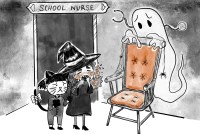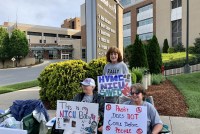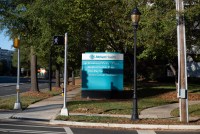Latest KFF Health News Stories
An Arm and a Leg: ‘Your Money or Your Life’: This Doctor Wrote the Book on Medical Debt
What happens when you can’t afford the health care you need? On this episode of “An Arm and a Leg,” hear from emergency medicine physician and historian Luke Messac about the history of medical debt collection in the United States.
Medical Debt Is Disappearing From Americans’ Credit Reports, Lifting Scores
As credit rating agencies have removed small unpaid medical bills from consumer credit, scores have gone up, a new study finds.
Medical Debt and Nurse Shortages Haunt Winning Halloween Haikus
Entries for our fifth annual Halloween haiku contest left us terrified. Based on a review by our panel of judges, here’s the winner and runners-up — plus the original artwork they inspired.
Tiny, Rural Hospitals Feel the Pinch as Medicare Advantage Plans Grow
More than half of seniors are enrolled in private Medicare Advantage plans instead of traditional Medicare. Rural enrollment has increased fourfold and many small-town hospitals say that threatens their viability.
For People With Sickle Cell Disease, ERs Can Mean Life-Threatening Waits
When patients with sickle cell disease have a health crisis — crescent-shaped red blood cells blocking blood flow — their condition can quickly lead to a fatal stroke or infection. But, despite efforts to educate doctors, research shows that patients are waiting hours in ERs and are often denied pain medication.
These Appalachia Hospitals Made Big Promises to Gain a Monopoly. They’re Failing to Deliver.
Ballad Health, the only hospital system across a large swath of Tennessee and Virginia, has fallen short of quality-of-care and charity care obligations — even as it’s sued thousands of patients for unpaid bills.
She Received Chemo in Two States. Why Did It Cost So Much More in Alaska?
A breast cancer patient who received similar treatments in two states saw significant differences in cost, illuminating how care in remote areas can come with a stiffer price tag.
Who Polices Hospitals Merging Across Markets? States Give Different Answers
Increasingly, hospitals are merging across separate markets within states. It’s a move that health economists and the Federal Trade Commission have been closely watching, as evidence shows such mergers raise prices for patients with no improvement in care.
Health Workers Warn Loosening Mask Advice in Hospitals Would Harm Patients and Providers
Clinicians, researchers, and workplace safety officers worry new guidelines on face masks from the Centers for Disease Control and Prevention might reduce protection against the coronavirus and other airborne pathogens in hospitals.
Abortion Bans Fuel a Rise in High-Risk Patients Heading to Illinois Hospitals
High-risk patients from states that heavily restrict abortion are coming to hospitals in states such as Illinois that protect abortion rights. The journey can mean more medical risks and higher bills.
She Paid Her Husband’s Hospital Bill. A Year After His Death, They Wanted More Money.
A widow encountered a perplexing reality in medical billing: Providers can come after patients to collect well after a bill has been paid.
Journalists Track Hospitals’ Delivery of Charity Care and the Menace of ‘Forever Chemicals’
KFF Health News and California Healthline staff made the rounds on national and local media this week to discuss their stories. Here’s a collection of their appearances.
California Offers Lifeline to 17 Troubled Hospitals
California’s new lending program for distressed hospitals will provide Madera Community Hospital with interest-free loans of up to $52 million if it can agree on a viable reopening plan with Adventist Health. The state will offer an additional $240.5 million in interest-free loans to 16 other troubled hospitals.
Community With High Medical Debt Questions Its Hospitals’ Charity Spending
Pueblo, Colorado, residents have higher-than-average medical debt, while the city’s two tax-exempt hospitals provide relatively low levels of charity care.
Feds Say Hospitals That Redistribute Medicaid Money Violate Law
Federal officials are trying to clamp down on private arrangements among some hospitals to pay themselves back for the Medicaid taxes they’ve paid. State health officials and the influential hospital industry argue that regulators have no jurisdiction over the agreements.
North Carolina Hospitals Have Sued Thousands of Their Patients, a New Report Finds
An analysis of court records by the state treasurer and Duke researchers finds Atrium Health, originally a public hospital system, accounted for almost a third of the legal actions against North Carolina patients over roughly five years.
Proposed Rule Would Make Hospital Prices Even More Transparent
A Biden administration proposal would help standardize the data on prices that hospitals provide to patients, increase its usefulness to consumers, and boost enforcement. Previous rules gave hospitals too many loopholes.
Patients in California County May See Refunds, Debt Relief From Charity Care Settlement
As hospitals are criticized for skimping on financial assistance, Santa Clara County has agreed to notify 43,000 former patients of possible billing reductions as part of a settlement. Some patients had sued, alleging the county’s hospital system sent them to collections for bills they shouldn’t have received.
Journalists Sum Up the Costs to Patients of New Weight Loss Drugs and Hospital Mergers
KFF Health News and California Healthline staff made the rounds on national and local media this week to discuss their stories. Here’s a collection of their appearances.
Your Exorbitant Medical Bill, Brought to You by the Latest Hospital Merger
After decades of unchecked mergers, health care is the land of giants, with huge medical systems monopolizing care in many cities, states, and even whole regions of the country. This decreases patient choice, impedes innovation, erodes quality of care, and raises prices. And federal regulators have been slow to act.

























